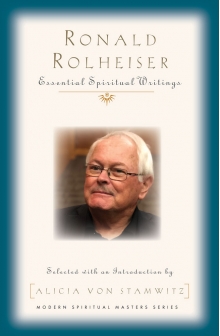Oblate Fr. Ronald Rolheiser delivers the keynote address during the opening of the National Catholic Educational Association's annual convention in Boston April 11, 2012. (CNS/The Pilot/Gregory L. Tracy)
Do you want to experience a mature, healthy, dynamic spirituality? Read Ronald Rolheiser, priest, theologian, teacher, author of 16 books and 2,000 columns, and a retreat leader and prolific speaker. Whether you are a devotee of Rolheiser or a Rolheiser neophyte, his Essential Spiritual Writings will convince you that his humane, accessible and hopeful spirituality make him an important contemporary writer.

Rolheiser comes from unlikely hardscrabble beginnings. growing up in the prairies of Saskatchewan in a family of 16 children. At age 17 he entered the Missionary Oblates of Mary Immaculate community and went on to receive a doctorate in theology from the University of Louvain in Belgium. He served as a regional superior of his order and, most recently, as president of the Oblate School of Theology in San Antonio. He has taught and lectured globally.
Rolheiser is clear that spirituality must be based on theology lest it become unhealthy, and he draws on the work of Augustine, Aquinas, John of the Cross, Karl Rahner and Henri Nouwen. However, his focus is on spirituality, what he calls "applied theology" and without it, theology is merely "intellectual aesthetics." He claims there are four essentials of Christian life: private prayer and morality, mellowness of heart, community as an element of worship and participation in the work of social justice.
Although his essential writings include discussion of these topics, Rolheiser's central premise from which all else follows is of a "sacred fire" implanted by God in all of creation. In humans this manifests as a desire for unity, wholeness and community. Our spirituality is how we live into this desire, this longing, how we overcome our separateness. As our defining characteristic, this "sacred fire" is a mixed blessing leading to a creative, exuberant life or a sense of being thwarted. If our longing is for the trivial, the result will be continued loneliness, restlessness and rootedness. The human quest is to create a life and then to give that life away.
One of the dominant expressions of this sacred fire is human sexuality. In a religion that historically feared sexuality and worked to control it, Rolheiser offers a wholistic understanding of this most human desire, one that promotes neither frigidity nor irresponsibility but is both chaste and passionate. Sexuality is a good, a manifestation of the sacred energy in all humans and a longing to overcome loneliness. It has many expressions — friendship, family, service, hospitality, nourishment and genitality — which are only some aspects of this powerful drive toward unity. Healthy sexuality of all kinds leads to joy and selflessness; unhealthy sexuality to unhappiness, selfishness, greater loneliness and separation.
Advertisement
The major life issue is how we live out our desire and longing. How do we overcome our separation? This is our spirituality. In life, separation continues until we give our lives away. Augustine said it first; we remain restless until we rest in God. Rolheiser asks us to consider the notion of ongoing incarnation. As part of the Body of Christ, Christians carry the responsibility to be the physical reality of God in the world. Our ordinary lives offer the opportunity to live creatively and generatively — to give our lives away. We are nourished in this work by prayer that helps us reclaim an intimacy with God and fulfills our longing to overcome our separateness.
In works of charity and social justice we also overcome our loneliness. Rolheiser is insistent that personal charity is not sufficient; we must challenge the unjust structures and institutions in which we are embedded. As we age and can no longer be productive, we can live into acceptance, which prepares us to give even our deaths away, bringing peace to those who remain.
It is the life of Jesus, especially his death, that serves as a model for our living and dying. Jesus pleaded to be rescued by his father, but he experienced abandonment as he died an ignominious death. Yet he trusted and in that dark hour he took into himself the hatred and cruelty of those who crucified him and transformed this through forgiveness. This is redemptive Christianity. The mystery of the Incarnation urges us in life and in death to continue this transformation. In living out our sacred fire, our spirituality, we overcome our loneliness and separation and we help redeem the world.
Ronald Rolheiser presents the Christian message in all its vibrancy, making him one of America's most important spiritual writers. His Essential Spiritual Writings prove why.



